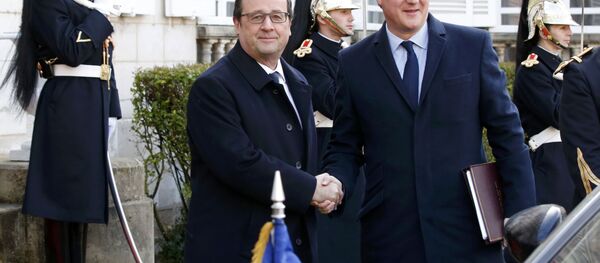France was a founder member of what has now become the European Union and is seen as a central pillar of the whole European project, but — in recent months — has seen a huge rise in anti-immigration sentiment and a surge in the popularity of the right-wing Front National party, led by Marine Le Pen.
The news follows a similar finding by de Hond in the Netherlands which saw 53 percent of Dutch wanting an EU membership referendum similar to the British vote. At this stage, 44 percent would vote to stay in the EU and 43 percent would vote to leave.
#Brexit: 53% des français souhaitent un référendum sur la sortie de l'UE https://t.co/3vTBOBr0Cx pic.twitter.com/8EZXCReyub
— Fondation Concorde (@FConcorde) 14 March 2016
(Tweet: "53 percent of French want an EU membership referendum")
The UK Prime Minister David Cameron fired the starting gun on his country's route to an In-Out referendum on EU membership, which will take place on June 23.
The poll by the University of Edinburgh found that after the French, the Swedes (49 percent) are in favor of holding a referendum on EU membership, followed by Spaniards (47 percent) and Germans (45 percent).
According to the London School of Economics, Greece is the second most Euroskeptic country in the European Union, with 50 percent of the Greeks thinking that they have not benefited from the EU at all.
'Devastating Effects'
According to the University of Edinburgh poll, 25 percent of the French want to see an end to the free movement of people throughout Europe — a central principle of the EU. Although not a majority, the finding is indicative of a rise in anti-immigration sentiment in France.
"The British referendum is a laboratory for other referendums in Europe. Such trivialization could produce devastating effects," Anand Menon, professor of political Europe at King's College London and director of 'UK in a changing Europe' told Le Monde newspaper.
Cameron is battling for the UK to remain within the EU and has negotiated what he calls "special status" for Britain allowing it a derogation from 'ever closer union'. He has also called for national governments to have the ability to overrule Brussels, a cut to red tape and the non-discrimination of non-Eurozone countries.
Europe split on Brexit and single market https://t.co/1ZSEbKJzaS
— Edinburgh University (@EdinburghUni) 10 March 2016
However, his most significant demand has been for the suspension of in-work benefits for EU migrant workers for up to four years. In the latest survey, 32 percent of French are in favor of depriving European foreign social benefits for the first four years of their stay.



